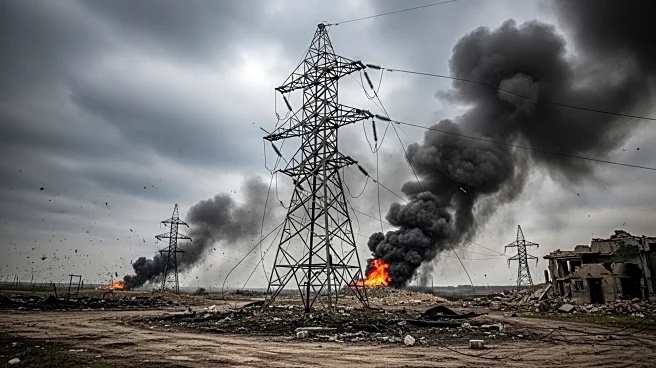What's Happening?
Russia launched a significant air assault on Ukraine, deploying dozens of missiles and approximately 500 attack drones. This attack targeted energy infrastructure across nine regions, resulting in the deaths of at least five individuals, including four in the Lviv region. The assault left tens of thousands without electricity, intensifying concerns about Ukraine's energy stability as winter approaches. Ukrainian President Volodymyr Zelensky emphasized the need for stronger air defenses and urged the U.S. and Europe to expedite defense agreements. The attack follows a pattern of Russian strikes on Ukraine's power and gas infrastructure, raising fears of a humanitarian crisis and potential refugee surge into the European Union.
Why It's Important?
The escalation of attacks on Ukraine's energy infrastructure by Russia poses significant humanitarian and geopolitical challenges. The damage to energy networks threatens to leave millions without heat during the harsh winter months, potentially leading to a mass exodus of refugees into neighboring European countries. This situation underscores the urgent need for international support in bolstering Ukraine's air defenses and imposing further sanctions on Russia. The conflict also highlights the broader implications for global energy markets, as disruptions in Ukraine could affect energy supplies and prices across Europe. The international community's response will be crucial in shaping the conflict's trajectory and mitigating its humanitarian impact.
What's Next?
Ukraine is calling for increased military support from Western allies, particularly in the form of advanced air defense systems like the U.S.-made Patriot systems. These systems are critical for intercepting Russian ballistic missiles, which continue to pose a threat to civilian infrastructure. Additionally, Ukraine is urging the imposition of new sanctions on Russia to further weaken its war economy. The international community, particularly the U.S. and European nations, faces pressure to respond decisively to prevent further escalation and humanitarian fallout. The coming weeks will likely see intensified diplomatic efforts to address the crisis and explore potential avenues for de-escalation.
Beyond the Headlines
The ongoing conflict in Ukraine raises ethical and legal questions about the conduct of war, particularly regarding attacks on civilian infrastructure. The targeting of energy networks and passenger trains highlights the devastating impact on civilian populations and the potential violations of international humanitarian law. The situation also reflects broader geopolitical tensions, with Russia's actions challenging the international order and prompting debates about the effectiveness of current diplomatic and economic sanctions. The conflict's resolution will require addressing these complex issues and finding a sustainable path to peace.








